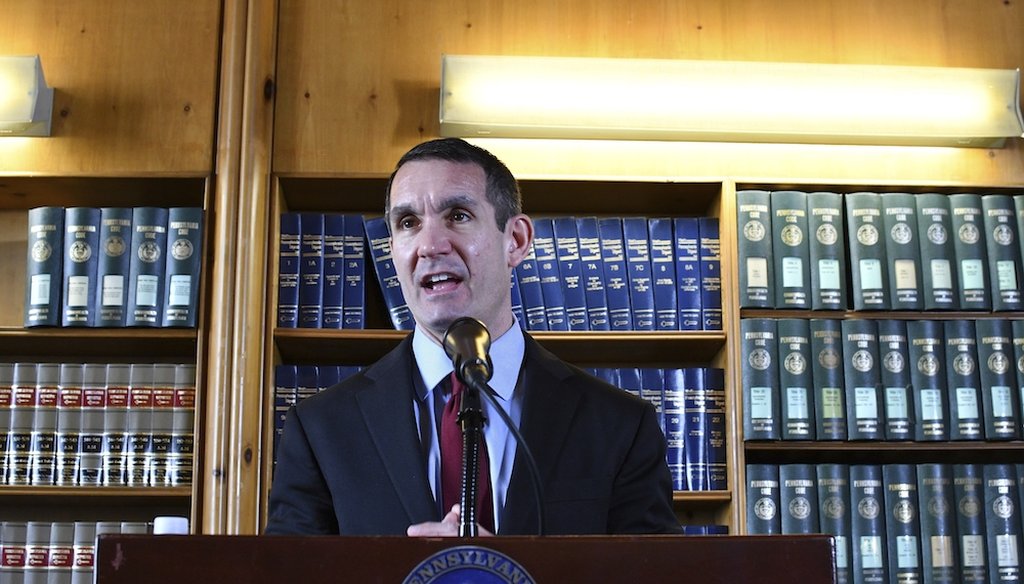



Pennsylvania Auditor General Eugene DePasquale speaks at a news conference in Harrisburg, Pa. (AP Photo/Marc Levy)
Trump’s payroll tax deferral could deliver relief of as much as $1,984 for some workers.
It remains unclear whether workers will need to pay the deferred taxes at some point.
Trump was ambiguous, but some on his team saw him fully ending the payroll tax, which funds Social Security and Medicare.
Pennsylvania’s 10th congressional district election pits an incumbent Republican, Scott Perry, against a competitive Democrat, Eugene DePasquale. The 10th is one of a group of toss-up races we are tracking ahead of the Nov. 3 election.
DePasquale runs the state’s Auditor General Office, the agency that keeps an eye on how the state spends its money. As Pennsylvania’s bean counter in chief, DePasquale waved a red flag when President Donald Trump announced that he was deferring workers’ Social Security payroll tax for a few months.
"The President’s temporary payroll tax holiday … could leave American workers liable for thousands of dollars during tax season and could potentially leave programs like Social Security and Medicare weakened — or worse," DePasquale tweeted Aug. 8.
Trump’s announcement left some big questions, such as whether workers would still be on the hook for the payroll tax. DePasquale’s carefully worded tweet left room for the uncertainty of the moment.
Trump issued a memo that told employers they didn’t need to send Washington the 6.2% out of each employee’s paycheck that helps fund Social Security. So, someone making $1,000 a week — the national median pay — could see an extra $62 every week. The tax break applies to people making up to $2,000 a week and would be in place for four months, September through December.
The more a person makes, up to the maximum, the more money they would keep. At the high end, a person could see a tax cut of $1,984 over those 16 weeks. That’s pretty close to DePasquale’s "thousands of dollars."
Trump had the power to defer collecting the tax, but as written, his order provided only temporary relief. At some point, the missed payments would need to be made up or count as foregone revenues to the Social Security trust fund. The memo said the administration will look for a way to let people keep the money, but that decision rests with Congress, not the president.
Trump announced the tax deferral after negotiations with Congress to pass another coronavirus economic relief package broke down.
When he rolled out the payroll tax holiday, Trump said something that portended a much bigger move — canceling the payroll tax altogether, pending the outcome in November.
"If I win, I may extend and terminate," Trump said. "In other words, I’ll extend it beyond the end of the year and terminate the tax."
Trump’s meaning was ambiguous. Later that day, a campaign legal adviser tweeted that he meant full elimination of the payroll tax. Taken literally, that would mean a loss of over $1 trillion for the two main programs funded by payroll taxes: over $900 billion for Social Security and over $275 billion for Medicare.
Both employers and employees pay the payroll tax, and it was possible that Trump was referring only to the worker portion or, for that matter, only to the Social Security portion, or only to the workers under the $2,000-a-week income threshold. Or he may have meant eliminating the payroll tax entirely.
DePasquale sent his tweet on Aug. 8. Over the next week, in a ping-pong pattern, Trump would repeat his desire to fully eliminate the payroll tax, and top administration officials would say he didn’t mean that. That back and forth took place after DePasquale’s tweet, so it plays no role in this fact-check.
On the day that Trump announced a temporary deferral of employees’ Social Security payroll taxes, DePasquale said that the move could cost people thousands of dollars during next year’s tax season and could potentially threaten Social Security and Medicare.
DePasquale’s dollar estimate of the deferred tax liability fits for the highest-paid workers affected by Trump’s plan, but those making less would see a smaller impact. He was correct that the repayment of the tax was an open question.
He was also correct that, taken at full face value, Trump’s words described a plan that would undermine the finances for Social Security and Medicare. Congress would have the final say, and Trump’s meaning was ambiguous.
But DePasquale bracketed his concerns with the words "could" and "potentially could."
DePasquale gave due regard to the uncertainties, but his dollar estimate applied only to the best-paid workers. We rate this claim Mostly True.
Eugene DePasquale, tweet, Aug. 8, 2020
White House, Memorandum on Deferring Payroll Tax Obligations in Light of the Ongoing COVID-19 Disaster, Aug. 8, 2020
White House, Remarks by President Trump in Press Briefing, Aug. 8, 2020
Email exchange, Kunal Atit, deputy campaign manager, DePasquale for Congress, Aug. 19, 2020
In a world of wild talk and fake news, help us stand up for the facts.
